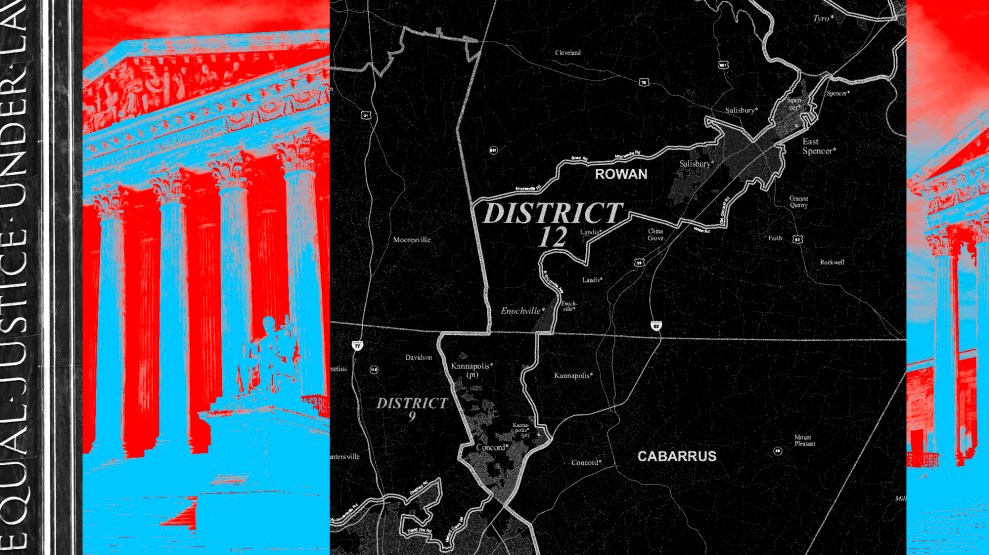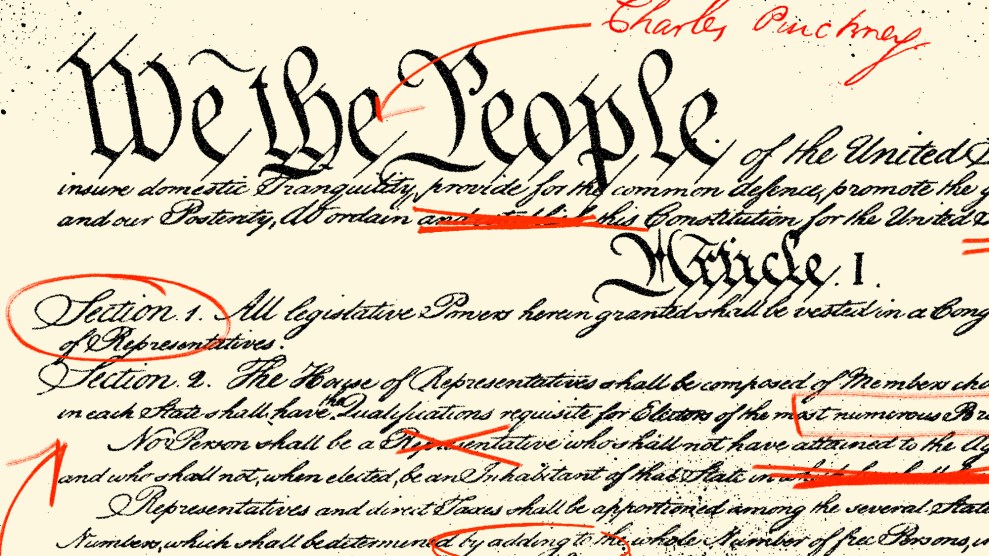
Mother Jones; United States Census Bureau; Getty
In a hugely significant opinion on Tuesday, the Supreme Court rejected the “independent state legislature” theory pushed by Republicans that would have given state legislatures virtually unchecked power to draw new redistricting maps and pass restrictive voting laws with little to no review by state courts or other entities. “The Elections Clause does not vest exclusive and independent authority in state legislatures to set the rules regarding federal elections,” Chief Justice John Roberts wrote in the 6-3 opinion in Moore v. Harper.
The case had huge national implications. Voting rights experts said the Republican position would eviscerate checks and balances in state government, giving state legislatures enormous power to rig state and national politics, and could have even emboldened them to attempt to overturn future election results, like Trump wanted them to do in 2020 but now with the veneer of legality.
The decision could have immediate ramifications in key battleground states like Wisconsin, where a new liberal majority on the state Supreme Court could strike down the state’s gerrymandered congressional map under the Wisconsin Constitution once a new justice is seated in August.
The Moore case was filed by Republicans in North Carolina, who argued that “the power to regulate federal elections lies with state legislatures exclusively.” They were backed up by the powerful dark money network of Federalist Society co-chairman Leonard Leo, who founded a group, the Honest Elections Project, that doggedly advocated for the “independent state legislature” (ISL) theory in briefs and other forms of advocacy before the courts. Thanks to these efforts, a position that was once considered fringe and extreme even in Republican circles was put squarely before the Supreme Court. Key figures involved in Donald Trump’s attempt to overturn the 2020 election amplified these claims, such as Trump lawyer John Eastman, who aggressively made the case that state legislatures could not be constrained by state constitutions or other actors during and after the 2020 election. Four conservative justices endorsed the ISL theory in the run-up to the 2020 election.
“This is a theory with big consequences,” Justice Elena Kagan said during oral arguments. “It would say that if a legislature engages in the most extreme forms of gerrymandering, there is no state constitutional remedy even if the courts think that that’s a violation of the constitution. It would say that legislators could enact all manner of restrictions on voting, get rid of all kinds of voter protections that the state constitution in fact prohibits. It might allow the legislatures to insert themselves and to give themselves a role in the certification of elections and the way election results are calculated. So in all these ways, I think what might strike a person is that this is a proposal that gets rid of the normal checks and balances on the way big governmental decisions are made in this country.”
The case originated from the most recent redistricting cycle in North Carolina, when the GOP-controlled state legislature passed a heavily gerrymandered new congressional map in 2021 that would have given the GOP between 71 to 78 percent of seats in a state where Trump got 49.9 percent of the vote in 2020. The North Carolina Supreme Court struck down the plan and ordered independent experts to draw new congressional lines; in 2022 that led to an even split in the state’s US House delegation. North Carolina Republicans then appealed to the Supreme Court.
But Republicans also flipped control of the state supreme court in the midterms and earlier this year a new conservative majority overturned the court’s decision striking down the congressional map, ruling that the court did not have the power to police partisan gerrymandering. That gave Republicans a green-light to pass a new congressional map that will take effect before the 2024 election and could give Republicans four new seats in the US House. The Biden administration and other allies argued that decision made the Moore v. Harper case moot, urging the court to dismiss it.
The Supreme Court ruled on Tuesday that the case was not moot and rejected the most extreme version of the independent state legislature theory outright. Justices Samuel Alito, Neil Gorsuch, and Clarence Thomas dissented, arguing that the case should have been dismissed as moot. Only two justices, Thomas and Gorsuch, fully endorsed the independent state legislature theory pushed by North Carolina Republicans.
The case hinged on an increasingly contentious battle over how the court interprets history. The Honest Elections Project asserted that the ISL theory simply honored “the founders’ choice,” but leading historians of the founding era called that argument completely ahistorical, noting that the federal Constitution was adopted in large part to counter the power of the states after the disastrous early tenure of the Articles of Confederation. And as my colleague Pema Levy reported, one of the key historical documents cited by North Carolina to support its position was widely considered to be a forgery. Justice Sonia Sotomayor remarked at oral argument that North Carolina Republicans and their allies could only prevail “if you rewrite history.”
In the end, six justices agreed with that position. “Historical practice confirms that state legislatures remain bound by state constitutional restraints when exercising authority under the Elections Clause,” wrote Roberts.
But Roberts also hinted that state courts could be subject to some limitations in the future and that the Court could decide that issue at a later date.
“While the Court does not adopt a test by which state court interpretations of state law can be measured in cases implicating the Elections Clause, state courts may not transgress the ordinary bounds of judicial review such that they arrogate to themselves the power vested in state legislatures to regulate federal elections,” he wrote. “The Court need not decide whether the North Carolina Supreme Court strayed beyond the limits derived from the Elections Clause, as petitioners did not meaningfully present the issue in this Court.”
Roberts, who 10 years ago wrote the majority opinion gutting the Voting Rights Act, surprisingly authored two decisions this term protecting voting rights, in Moore v. Harper and Allen v. Milligan, where the Court struck down a racial gerrymander in Alabama that deprived Black voters of fair representation.












